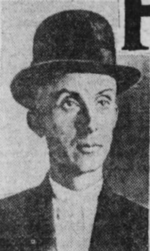 Detroit Free Press, June 17, 1923. On June 17, 1899, James Brown was plowing the fields of his farm in the Native American territory in Adair County, Oklahoma, when he was shot and killed. Charner Tidwell, a Cherokee worker at Brown’s farm who was only 17-years-old at the time, was accused of the murder based on the testimony of James Brown’s son. The prosecution argued that Tidwell had murdered Brown because he was in love with Brown’s wife. Tidwell was convicted in federal court and sentenced to life in prison. Throughout his trial and in the subsequent years that he spent in penitentiaries in Ohio and Georgia, Tidwell maintained his innocence. He was denied pardons by Presidents Roosevelt, Taft, and Wilson. By 1913, Brown’s son had admitted that his testimony in which he identified Tidwell as his father’s killer was perjured. In an effort to obtain additional information about the crime in furtherance of obtaining a pardon for Tidwell, Judge John R. Thomas of Muskogee, Oklahoma, traveled to Atlanta, Georgia, in January 1914 to speak with Tidwell at the federal prison. However, while Judge Thomas was at the prison, a riot broke out and a prisoner killed Thomas. Following Judge Thomas’s death, efforts to free Tidwell stalled. Nearly a decade later, an Oklahoma Congresswoman named Alice Robertson notified U.S. Attorney General Harry M. Daugherty of the new evidence of perjury in Tidwell’s trial. Assistant Attorney General Crim, who was in charge of the Department of Justice Criminal Division, studied the case and found that the entire case against Tidwell was based on the testimony of one witness, who had since admitted his testimony was false. Daugherty subsequently made his recommendation for clemency to President Harding. Tidwell’s sentence was commuted and he was freed from prison in early 1922, then before being formally pardoned by President Harding on March 21, 1923. Prior to Tidwell being pardoned, the widow of James Brown admitted on her deathbed that Tidwell was innocent and that her second husband had killed Brown. Her affidavit stated: “The Lord has been wanting me to tell it for all these years and I am afraid he won’t forgive me for not telling it.” While Tidwell was in jail, he inherited Oklahoma oil lands and became a millionaire after his release. – Researched by Benjamin Stix
|